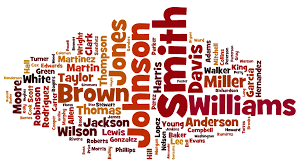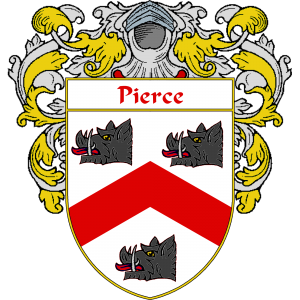When you first begin your family genealogy you might find it extremely helpful along the way if you first do a quick research for the origin of your surname. In your search you will be starting with yourself and working backwards and in doing so you will gain surnames for each generation as you go back, so having a little knowledge of surname origins can and will be a big help in your research.
Your last name is commonly referred to as your SURNAME. Your first name is referenced as your GIVEN name, and of course you have your MIDDLE name. You will gain a surname for your mother’s maiden name, your grandmother’s maiden name and so on. A quick research of the origin of that name can tell you where you evolved from in a sense.

Family tree research is one giant step backwards and one giant step forward—usually at the same time.
My maiden name is PIERCE. Pierce is an English surname from the established name Peter, which in medieval England was found as PIERS. Peter come from the Greek word “PETRO” which means “rock”. PIERS is the French version brought by the Normans in 1066 at the time of the Conquest.
From this bit of information I know that the name originated in England. Are all PIERCE’s English. NO! But it is a good assumption, and as to how far back one might have to go to get there is unknown to me at this point. I merely had to go back to the 1600’s to find my George PIERCE that was born in England. I haven’t gone farther back than that to find if they had been somewhere else first. Family says there was some Irish in there somewhere.
There are as many as 16 versions of the PIERCE name,
PIERCE PEARCE PIERS PEERS PERES PERSE PEERZ 
just to name a few. Being able to recognize the variances you will more likely be able to spot a record that you might bypass otherwise, as in many census and military records you will find have variations in spellings. There are several reasons for this.
- your ancestor may not have been able to read or write.
- the census taker spelled it to their interpretation.
- the transcriber may not have been able to make out the name and took a wild guess.
- generations back people weren’t as particular about a spelling as we are today. (probably because of the reasons mentioned above.)
- Immigrants often times changed the spelling or shortened their names in order to become more “American”.
- Many times immigrants did not know the English version and the immigration officer would record it incorrectly.
- It could be that the person giving the information didn’t know the correct spelling.
- Many of the records are sent over seas to India and such to be transcribed and it could just be a failure on their part to get it correct.
We are human. We make mistakes.
“Get your facts first, then you can distort them as you please.” —Mark Twain
Only four generations back in the PIERCE family tree we find that one half of the family changed their name to the spelling PEIRCE. We believe because the father, MOSES had two families and the second family wanted to associate separately from the first, but that is just and assumption.
While searching for my fourth great grandfather, Adam SHAVER I found several instances where variant spellings came to play. SHAFFER and SHAVEN just to name a couple. So in searching records don’t overlook the possibility of finding lots of differences.
Surnames became necessary in the 13th century when governments introduced personal taxation. They originated to help identify people. Centuries ago when the world was less populated people would be referred to has John, or Fredrick. Everyone knew their neighbors and friends, and where they lived, what their occupations were, etc., people did not so readily move, and families lived in close proximity to each other. Therefore, for example, if John had a son down the lane, he might be referred to as Johnson. This would be considered a patronymic name. In most regions and time periods, surnames were assumed based on descent from your male ancestor (generally the father). A matronymic surname would be that deriving from the mother. Use of the mother’s surname is usually due to some circumstance such as illegitimacy, inheritance etc., though in some regions culture dictated the use of the mother’s surname. Or perhaps, Joe made pottery. He could have earned the name Joe Potter. They call this an occupational name. I have lot’s of Miller’s in my family. A Miller was someone who ground grain, this is Mueller in German, therefore we also have Mueller’s in the family. Get the picture?
- “Genealogy: An account of one’s descent from an ancestor who did not particularly care to trace his own.” —Ambrose Bierce
In many countries, the use of hereditary surnames began with the nobility who often called themselves after their ancestral seats. It wasn’t until the 1500s that surnames became widely inherited and no longer referred to a person’s appearance, job, or place of residence. Perhaps the caveman method would have made it easier for us as genealogist had we had something to go by. When searching for William Robert GREEN, it would sure be nice to have an occupation or dwelling to go off of if you have no other information. Believe me, I KNOW!
In conclusion, I highly recommend with each new surname you start with a little research. A few moments to do a little study on the name and it’s origin and the different derivatives of the names and variations of spelling could save you a lot of time and headache down the road as you search. You will come across records that will make you shake your head in wonder. A little more research and you might just also learn a good little bit about that special ancestor before you even start your search. Knowing the origin of your name puts you just a little bit closer to who you are and where you came from and what has gone before you.
It’s a feeling only another family historian could explain.
Happy Hunting!
